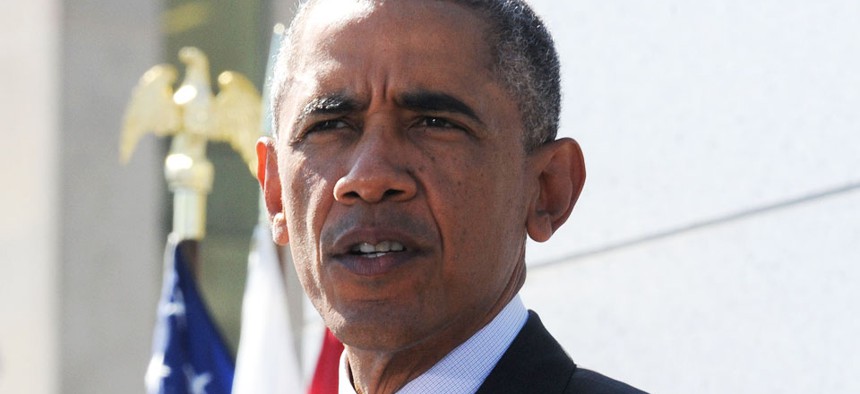
Veterans Affairs Department
The president made headlines last week during a speech on the economy, where he implored voters not to make any errors: "Now, I am not on the ballot this fall .... But make no mistake: These policies are on the ballot—every single one of them." On Sunday's Meet the Press , his former chief strategist David Axelrod said it was Obama who'd made a "mistake."
The case against Obama's remark is simple enough: Democrats are on the verge of losing their hold on the Senate. The president's approval ratings aren't great anywhere these days, and his party will only hold on if its candidate can survive in Southern states where Obama is especially unpopular—places like Arkansas, Georgia, Kentucky, Louisiana. These candidates are eager to make the race about anything other than the president—because if it's a referendum on him, the attack ads, as they say, write themselves.
It's probably unwise to question David Axelrod's strategic sense, but there might be something to Obama's strategy. Some critiques from other analysts have seemed to assume that Obama had simply blundered or misspoken on the dais. But that line was in the prepared remarks. Presumably it was carefully thought out—so it could still be a strategic misstep, but it was clearly a calculated line.
What would make the president say such a thing?
First, remember that there's no such thing as a swing voter in midterms. Okay, that's not quite true ... but it's close. As UCLA political scientist Lynn Vavreck noted in The New York Times , the difference between Obama's victory in 2008 and the Democratic shellacking in 2010 wasn't that a lot of voters soured on the president and opted for the Republican lever. It's that Democratic partisans just didn't show up. The percentage of voters in each party who switched was actually about the same:
Few Voters Changed Parties Between 2008 and 2010

Meanwhile, most voters who claim to be independent are actually closet partisans—leaning strongly toward one party or the other. (Don't send me that email. I'm sure you're the exception that proves the rule.) And the voters who hate Obama and everything he stands for are probably already headed to the polls, something confirmed by polls showing greater GOP voter enthusiasm.
All this means that the risk of Obama turning off voters who might otherwise come out and vote for Democrats is maybe not that big. On the other hand, these are close races; small margins matter, and in a state like Arkansas, which used to be a solid blue state but has tilted redder and redder in recent years, why give wavering Democrats an excuse to vote against Senator Mark Pryor?
It might have something do with the kind of voters to whom Obama is speaking. Having stipulated that swing voters don't really exist, the trick to winning is to maximize base turnout. For Democrats in the South, that means black voters. Obama's approval ratings may be in a serious slump, but he remains very popular with non-whites. Over the summer, Gallup had his approval among black voters at more than 80 percent. He also polls strongly among non-white voters more broadly. That's why, as my colleague Molly Ball reported in August, Democrats are pouring resources into voter-mobilization efforts, signing up new voters and trying to squeeze as many votes as possible out of places like Pine Bluff, Arkansas.
This is also why reason Democrats are eager to fight against voter-ID laws. Last week, a coalition of liberal groups won a victory in North Carolina, convincing an appeals court to stay changes to the law that would restrict voting. As the court noted, these laws disproportionately affect minority voters, by design or not.Attacking these laws serves a dual purpose for Democrats: It protects the votes of likely Democrats, and it probably increases their enthusiasm for going to the polls. Backlash against a rash of voter-ID laws in 2012 was seen as one key driver of increased black turnout.
This doesn't make it any less surprising that Obama is trying to make the election about himself. Presidents' parties almost always lose seats in their sixth year, in large part because of voter fatigue with the man in the White House. And the Obama administration has tended toward caution, yanking an immigration executive order over the fierce protestations of activists who said it would endanger the Hispanic vote. (As Politico noted last week, that wager seems to have paid off: Activists have swung into action getting Democrats to the polls, rather than exacting retribution. After all, what were they going to do? Back Republicans, who are even less likely to move on reform?)
These numbers are also little comfort for someone like Senator Mark Begich, who's clinging to his life in Alaska, a state with a 3.6 percent black population where the president's approval is some 20 points underwater.
Obama's bet may still not pay off. And it's an acknowledgment of where the races stand—Democrats aren't on the offensive at this point. But it's not quite as crazy as it initially seemed.
NEXT STORY: Federal Student Aid: Pioneers Managing Risk






